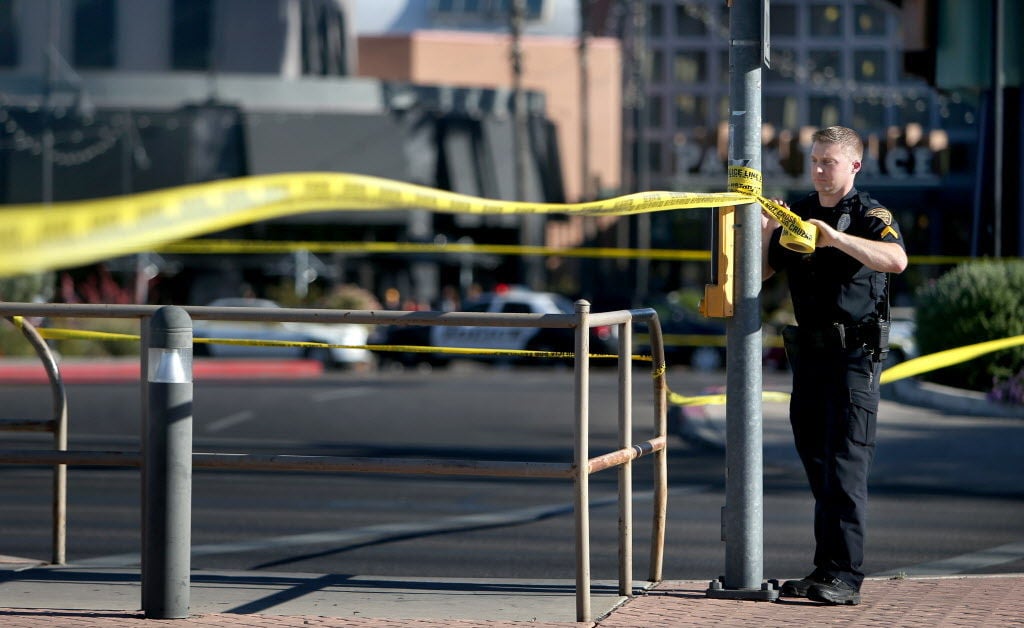A database to track local hate-crime trends is being created by the Tucson Police Department, officials say.
The frequency of reported hate crimes here remains relatively low compared to other jurisdictions.
In 2016 and 2017, TPD reported five hate crimes each year, according to Star archives. Across Arizona 264 hate crimes were reported in 2017, up from 213 reports in 2016.
“Our numbers are pretty low,” Detective Dana Davis-Richardson told an audience of about 15 people last weekend, during the department’s first public forum on hate and bias crime.
In 2018, the Southern Poverty Law Center tracked 20 hate groups in Arizona, two in Tucson: an anti-Muslim group and a black nationalist group. There is also an anti-immigrant group in Sierra Vista. The center also tracked four anti-LGBT groups in Phoenix.
The new database will allow TPD to identify trends among reported hate crimes. A “potential bias” section has been added to police reports to notify the Tucson Street Crimes Interdiction Unit of possible hate crimes and incidents.
Earlier this spring, the unit was assigned to hate-crime investigations and since then, the program has been slowly building, said Detective Tristan Pittenridge, a Tucson police liaison for hate and bias crimes.
The database will organize hate crime and incident patterns, like location, type of crime, type of bias and the perpetrators and victims. The data collection will be similar to the current TPD Crime Mapping program, said Pittenridge, but he is unsure if it will be available to the public.
Patrol officers are trained to recognize bias when responding to calls. The new section in police reports for “potential bias,” can include anti-Jewish or anti-LGBT, for example, with boxes for officers to check if they suspect this kind of motivation.
“They err on the side of caution. We get a lot of cases that aren’t bias, but they just want to make sure it gets double-checked,” said Pittenridge, who was the primary presenter at the forum.
This two-tier system for such incidents, first vetted on site by patrol officers, then secondly by the detectives, has ruled out many “potential bias” crimes as hate crimes.
“We currently track confirmed incidents, cases that are definitely hate crimes. Starting next year, we’re going to start dissecting the incidents. A lot of the cases we have now just have bias elements,” said Davis-Richardson, the detective. He estimated that Tucson has fewer than 30 incidents per year. Those incidents don’t specifically constitute a hate crime, however.
As for the first forum and future community hate crime training sessions, Pittenridge said he and his unit “want everybody to be on the same page.”
The FBI defines a hate crime as a “criminal offense against a person or property motivated in whole or in part by an offender’s bias against a race, religion, disability, sexual orientation, ethnicity, gender, or gender identity.”
If there is no criminal offense but bias against one or more of the protected classes listed above exists, then it is an incident. These incidents may still be recorded and documented depending on the severity.
“That’s what we have to figure out and it’s a very thin line we walk,” said Pittenridge.
Federal laws exist to punish hate crimes, however Arizona does not have a hate crime statute. Sentencing enhancements exist, like extending prison sentences and prohibiting an early release.
Tucson created a hate-crime ordinance in the 1980s. Tucson city code 11-30 says that if a misdemeanor is committed and there’s evidence of bias motivation based off the victim’s protected class, then someone could be charged. The severity of the punishment depends on the crime.
For a first offense, an offender could see anywhere between 10 days to six months in jail, along with a $100 to $2,500 fine. A second offense has a minimum of 20 days, a third offense carries a minimum of 40 days behind bars and both have a maximum jail time of six months. The fines raise to $200 and $400 respectively, with a $2,500 limit.
“The city’s doing the best they can do,” said Pittenridge in response to an audience member who commented on the “light” repercussions for hate crime misdemeanors. “And we can’t charge felonies through city court.”
Depending on the severity of the case, it may be handed to the FBI. The 2018 FBI hate crime report should be released in the coming weeks.
“I think historically there has been underreporting through minorities, through people with different sexual orientation, and that’s part of the reason why we’re starting to do these types of things. Because we want to reach out to people,” said Detective Gilbert Martinez, who also spoke about TPD’s Safe Place initiative.
In the wake of a potential hate crime, the victim can find help in Tucson businesses that have the Safe Place rainbow shield displayed in their window. Employees are trained to contact the police.
“We’re trying to reach out to the community and let them know that the (Tucson Police Department) is out there, and that we’re actually trying to stop some of these hate crimes,” said Martinez.





